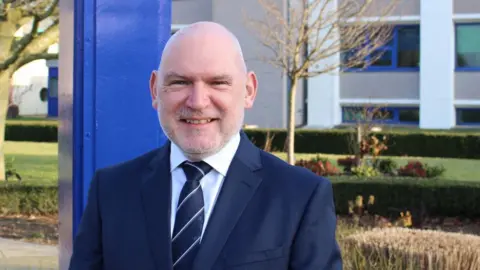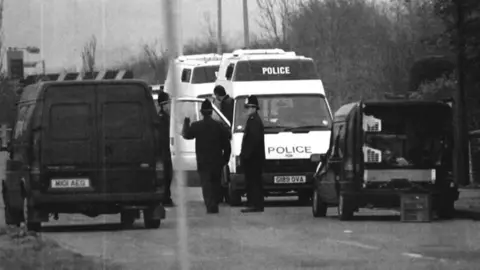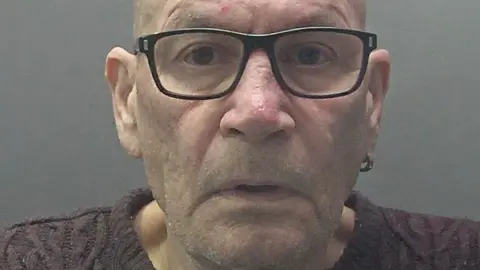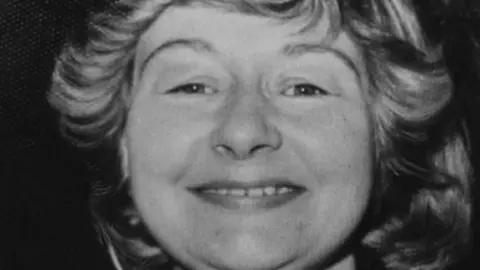The detectives trying new tricks on old cases
 Cambridgeshire Police
Cambridgeshire PoliceA team of cold case detectives recently involved in solving three major crimes still has more than 70 unsolved murders on its books.
The specialist investigators are part of a joint major crime unit set up by police forces in Bedfordshire, Cambridgeshire and Hertfordshire.
Their work has made headlines in recent years after men involved in the killings of Carol Morgan in1981, Rikki Neave in 1994, and Una Crown in 2013, were jailed.
The team - which began life nearly 20 years ago - has been compared to the fictional officers featured in the BBC drama New Tricks.
 PA Media
PA MediaSenior officers say the team has 78 unsolved murders, nine unsolved attempted murders, and less than 50 unsolved serious sex crimes on its books.
They say unsolved major crimes are subject to a system of review and the oldest cold case dates back to 1955.
Det Ch Supt Ian Simmons, who heads the major crime unit, does not expect the numbers of unsolved murders to grow.
He said police solve most murders now and he thinks the number of unsolved crimes will drop because of scientific advances.
Det Ch Supt Simmons said 21st-Century detectives have access to evidence - including DNA, information stored on mobile phones and CCTV - police could not have imagined decades ago.
"That is why we are probably quite successful in solving current cases - because of the range of investigative opportunities, tactics, covert techniques and so on that are available to us," he said.
He added: "If you take an investigation from 1955, for example - no phones, no automatic number plate recognition, no CCTV."
He said the "beauty" of reviewing an old unsolved case was the benefit of "hindsight".
 Cambridgeshire Police
Cambridgeshire PoliceThree Headline Cases
- Rikki Neave: In 2022, the killer of a six-year-old schoolboy who evaded justice for nearly three decades was jailed for a minimum of 15 years. Rikki Neave's naked body was found posed in a star shape near his Peterborough home the day after he disappeared in November 1994. He had been strangled. Three years ago, James Watson, then 41 but 13 at the time of Rikki's, was convicted of murder.
- Carol Morgan: A husband accused of hiring a hitman to murder his former wife in 1981 was found guilty and jailed in 2024. Carol Morgan, 36, was killed in a shop she ran with her husband Allen Morgan in Leighton Buzzard, Bedfordshire. Morgan, who is now in his 70s, from Stanstead Crescent, Woodingdean, Brighton, denied conspiring to murder.
- Una Crown: A man who carried out "a ferocious and sustained knife attack on a defenceless old lady in her own home" more than a decade ago was jailed in February after being convicted of murder. The body of former postmistress Una Crown, 86, was found at her bungalow in Wisbech, Cambridgeshire, on 13 January 2013. She had been stabbed four times and her throat cut. Neighbour David Newton, who is now in his 70s, was prosecuted after a DNA breakthrough.
 Bedfordshire Police
Bedfordshire PoliceDet Ch Supt Simmons said the team did not routinely tell the public, or victims' families, when unsolved crimes were being reviewed.
And he said detectives sometimes concluded an unsolved crime should not be "proactively" re-examined unless new information emerged.
But he said everything "is on the table for reinvestigation" and victims' families should know that no case was "put to bed".
Det Ch Supt Simmons said: "We have got a large number of undetected investigations that go back decades, which we routinely review on a time basis, whether it's two years, five years, 10 years.
"And it depends on solvability factors.
"It depends on whether witnesses or victims and families are still alive.
"It depends on forensic factors."
Mine of information
The team has access to crime exhibits going back decades and works with an archivist.
Det Ch Insp Nick Gardner, who is in day-to-day charge, said some exhibits were kept at stores in Hertfordshire and Cambridge - and some in a more unusual location.
"There's a lot in a large salt mine in Cheshire," he explained. "Material is kept there because of the climatic conditions."
He said anything relating to murder was kept for 100 years.
"Paperwork in particular, some of it is starting to degrade," he added
"We are starting of getting to the point of trying to digitise as much as possible."
 PA Media
PA MediaDet Ch Insp Gardner said the oldest "solved" case was the 1981 murder of Carol Morgan.
He said the older cases were most demanding.
"Cases we were not able to solve in the 2010s, 2000s, there is going to be so much more evidence available," Det Chief Insp Gardner explained.
"The older cases are almost either a change of allegiance or a complete re-imagining."
Det Ch Insp Gardner said the three-force cold case team was "absolutely" value for taxpayers' money.
Senior officers say resources limit the type of unsolved crimes which can be routinely re-examined.

Fact and Fiction
- Television viewers might draw parallels with New Tricks - a drama, which has starred Dennis Waterman, James Bolam and Amanda Redman, about a police cold case team made up of a serving officer and three retired detectives
Follow Cambridgeshire news on BBC Sounds, Facebook, Instagram and X.
